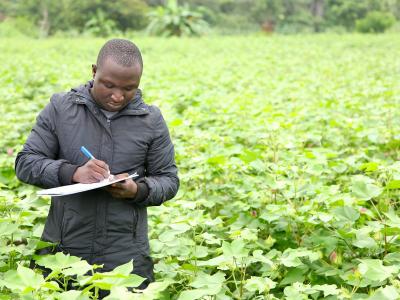Embracing uncertainty while planning for resilience

UNDP, UN Environment and UNITAR highlight the pivotal role of National Adaptation Plans in turning the Paris Agreement into action
By Mozaharul Alam (UN Environment), Rohini Kohli (UNDP) and Angus Mackay (UNITAR)
Uncertainty plagues our world. On its own, it can destabilize nations, undermine decisions and create poverty traps that derail global efforts to achieve the goals outlined in the Paris Agreements, 2030 Agenda and national development plans.
Climate change raises the stakes, making it harder for decision makers to plan for the future due to rising sea levels, higher temperatures, increased rainfall variability, failed crops, droughts, climate-induced migration, and the spread of disease.
So how do we respond to a world of increasing climate change induced uncertainty?
We would suggest that the answer lies in effective medium- to long-term adaptation planning. Key to this will be the formulation and implementation of National Adaptation Plans. These plans will support nations worldwide in achieving their Nationally Determined Contributions to the Paris Agreement, and serve as a blueprint for future climate action.
To implement these plans, we must better understand the nature of the risk, foster greater innovation and increase understanding and ownership. All of this implies placing climate change learning at the centre of the national planning process.
Flexibility will also be key as the rethinking of established development practices will inevitably become the norm.
Connecting learning with adaptation planning
National Adaptation Plans are more than a series of procedural steps. They require constant adjustment and re-adjustment. At each stage, it will be crucial to learn from successes and mistakes and to update our approaches accordingly.
Planning is also a moving target that will need to be constantly adjusted to changing climatic realities and evolving technology, while continuing to be shaped by local contexts.
Above all this implies a need to build greater human capacity on the ground. For example, planners will need to be able to conduct and interpret assessments of climate change impacts and vulnerabilities. With an improved knowledge and skills base, national (and local) leaders can better prioritize climate actions that will help to sustain broader societal goals.
But the immediate reality is that while we’ve been aware of climate change for decades, climate change education is still very much in its infancy.
Achieving real ownership
One way to achieve greater ownership in national adaptation planning is by looking at the 50,000-foot overview provided through the Doing Development Differently Manifesto.
This increasingly accepted viewpoint acknowledges that all too often development initiatives fail to achieve real impact, because they fail to achieve real ownership.
While uncertainty can never be eliminated entirely – there are plenty of wildcards that will cause speedbumps along the way – a good way to manage risk is by making multiple “small bets” to pilot and test initiatives before taking successful measures to scale.
The UN can play a key role here as a knowledge broker, bridge-builder, educator, convener and coordinating body, with the capacity to share what works well with those who need it most.
We are getting closer every day – with many first-generation climate adaptation projects collecting lessons learned and scaling-up successes. For example the huge improvement in the availability and accuracy of climate information in Malawi is revolutionizing adaptation planning, while successful water management practices in Colombia have dramatically improved food security and reduced climate risks.
Major initiatives like the joint UNDP-UN Environment National Adaptation Plans Global Support Programme (NAP-GSP), are helping countries to scale up what works well, working increasingly in collaboration with other key initiatives such as the One UN Climate Change Learning Partnership (UN CC:Learn).
National Adaptation Plans are fundamental to achieving the Paris Agreement and the Sustainable Development Goals. Most importantly they can help to secure a better future for the billions of people worldwide who face the rising threat of hunger, malnutrition, and uncertainty resulting from climate change. They provide a mechanism to empower those that are most vulnerable through a chain of improved knowledge, skills and decision making leading to a whole ‘new generation’ of more effective climate action.
A version of this article was originally published on Thomson Reuters Foundation News.
About the authors:
Mozaharul Alam is a Regional Coordinator for the Climate Change Programme at UN Environment and co-leads the NAP-GSP programme with UNDP’s Lead Technical Specialist for National Adaptation Plans, Rohini Kohli. Angus Mackay heads the UN CC:Learn Secretariat. Learn more about these initiatives and more at UNDP-supported National Adaptation Plans side events during this year’s COP.
Learn more about National Adaptation Plans: Building Climate Resilience in Agriculture in the upcoming Massive Open Online Course presented by FAO, UNDP and UNITAR. The MOOC kicks off on 13 November and is free to the public.